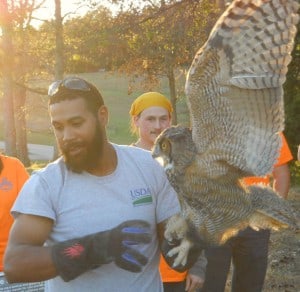Share this article
Close encounters of a raptor kind
In mid-November, the Wildlife Services-Missouri program gave Jefferson City Boys and Girls Club an up-close and personal experience with common raptors. With assistance from the Wildlife Club of Lincoln University, Steven Beza, a Wildlife Services (WS) biological science aide, introduced about 50 youngsters to several raptors and a falcon, which had been captured at two airports where WS works to reduce aviation-wildlife strike hazards.
Beza and Wildlife Club members explained why and how the raptors are captured and answered an array of questions. The youth then watched the release of four Red-tailed hawks, a Cooper’s hawk and a great-horned owl as well as an American kestrel (see video link below.)

©USDA Wildlife Services
Six raptor species are among the top 20 hazardous bird species at airports. Although most strikes between aircraft and birds don’t damage the aircraft, almost all injure or kill the birds. Wildlife Services traps and relocates 100-200 raptors in Missouri each year, protecting birds, planes and passengers.
Wildlife Services-Missouri has conducted 10 to 12 capture-release of raptors for youth groups throughout the state in the past year. Last April in Columbia, the lecture and release was coordinated with a reading program for youth in a low-income housing community. A Kiwanis Club, the public schools and Columbia Reads donated Kindle tablets with access to a digital reading program with more than 5,500 books – including wildlife books.
Beza speaks enthusiastically about the numerous wildlife presentations he has given at local schools and clubs. He says he wants young people to understand that there are job opportunities for any of them who are captivated with wildlife, as he was. A senior in Agricultural Science emphasizing natural resource management and a wildlife management minor, Beza works periodically during the school year but fulltime during summer and winter breaks as a WS intern. In the past three years he’s worked in five Midwest states and in Maine.
Lincoln University’s Wildlife Club currently has about 20 members, with the goal of becoming a full TWS student chapter.








